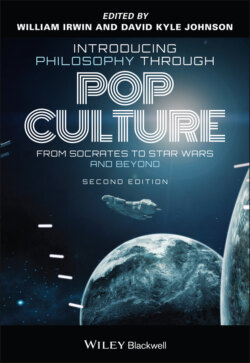Читать книгу Introducing Philosophy Through Pop Culture - Группа авторов - Страница 16
Oh My God! They Killed Socrates! You Bastards!
ОглавлениеIn Plato's (428–348 BCE) Apology, Socrates defends himself against two charges: (i) impiety (false teachings about the gods, possibly that they don't exist) and (ii) corrupting the youth of Athens. In reality, Socrates probably had as much chance of winning his case as Chef did against Johnny Cochran's “Chewbacca” defense! What is most important about Socrates's defense, however, is not so much what he says as how he says it. He defends himself by questioning his accuser, Meletus, leading him through a process of reasoning. For example, Socrates refutes the charge of corrupting the youth as follows:
Socrates: You say you have discovered the one who corrupts them, namely me, and you bring me here and accuse me to the jury…All the Athenians, it seems, make the young into fine good men, except me, and I alone corrupt them. Is that what you mean? Meletus: That is most definitely what I mean. Socrates: You condemn me to a great misfortune. Tell me: does this also apply to horses do you think? That all men improve them and one individual corrupts them? Or is quite the contrary true, one individual is able to improve them, or very few, namely the horse breeders, whereas the majority, if they have horses and use them, corrupt them? Is that not the case, Meletus, both with horses and all other animals? … It would be a happy state of affairs if only one person corrupted our youth, while the others improved them. You have made it sufficiently obvious, Meletus, that you have never had any concern for our youth; you show your indifference clearly; that you have given no thought to the subjects about which you bring me to trial.3
Through the analogy with horse training, Socrates shows how illogical the accusations against him really are. Just as a majority of people would injure horses by training them, and only a few good trainers improve them, so too it is likely that a few teachers improve the virtue of the youth, while many others corrupt them. Socrates argues, further, that he is in fact the one who is teaching Athens' youth what virtue involves, while many others – including the idiots sitting before him – corrupt them. (As you can imagine, this did not go over well with the jury.)
While showing that the accusations are groundless, this “apology” – a word that also can mean defense – demonstrates why Socrates got a death sentence of hemlock. Socrates is famous for saying “I know that I don't know” and, actually, this is a wise insight. For Socrates, philosophy was the love and pursuit of wisdom, and this required questioning others to find out what they do or don't know. Unfortunately, people often believe they are wiser than they are. By questioning them, Socrates would show them that they don't know what they believe they know: “I go around seeking out anyone, citizen or stranger, whom I think wise. Then if I do not think he is, I come to the assistance of the god and show him that he is not wise.”4 What makes Socrates wise is his recognition of his own ignorance, through continuous questioning of himself and others. Many powerful people in Athens saw him as dangerous because his questioning and debate would undermine their bases for power.
In the town of South Park, people in positions of power believe they are teaching the children wisdom and virtue. However, as in Athens, the many people of South Park seem to make the children worse, not better. For example, Mr. Garrison “teaches” the children creationism before switching to an absolutist Darwinism, Mrs. Broflovski always goes to crazy extremes with her “moral” outrage, Uncle Jim and Ned teach the boys to kill harmless bunnies and squirrels in “self‐defense,” and the mayor panders shamelessly to voters. None of the townsfolk really talk to the children, except Chef (R.I.P.), who taught the art of making sweet, sweet love to a woman. Blindly following the crowd, from protesting Terrance and Philip to boycotting Harbucks, to – yes – burying their heads in the sand to avoid watching Family Guy, the parents of South Park corrupt the children far more than a television show ever could. As in “Something Wal‐Mart This Way Comes,” their mindless consumption leads to an unrestrained cycle of economic and mob destruction. Like the Athenians, the adults don't know as much as they believe they know. Ultimately, if television does corrupt the children, it does so because they are left to it by their parents, with no one to educate them about what they are seeing. Of course, there are also cases where parents and people in powerful positions do try to discuss issues and ideas with the children. These discussions, though, support the same point, as the adult usually sounds like a bumbling idiot.
